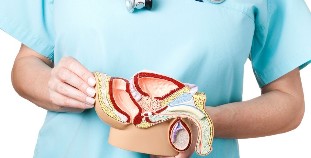The last few decades marked increase in the incidence of prostatitis. The connection is traced with the increased resistance of microbial pathogens to antibacterial agents, as well as with the growing freedom of sexual relations.

The causes of the disease
Is caused by an inflammation of the prostate tissue, especially male pathology. The prostate is located just below the bladder, such as clutch covers the urethra.
Inflammation can be infectious and non-infectious nature. In the first case the causative agents are:
- Of sexually transmitted infections.
- Non-specific causative agents of chronic lesions.
- Nosocomial infection acquired during surgery.
Non-infectious form of the disease occurs when stagnant blood in the small pelvis, prolonged abstinence, excessive sexual activity, and decreased immunity, hypothermia, alcohol abuse. With the development of prostatitis in men treatment medicines is carried out in the first place
Classification
Main types:
- Sharp.
- Chronic bacterial.
- Chronic prostatitis/chronic pelvic pain syndrome.
- Asymptomatic chronic.
What happens in acute disease
In prostate tissue get the bacteria. Most often it is the representatives of conditionally pathogenic flora – E. coli, Staphylococcus, Klebsiella, Proteus.
By reducing the immune defense creates good conditions for their reproduction: prostatic juice is a concentrate of nutrients, glucose, vitamins, which dilute the sperm and support the viability of spermatozoa.
The waste products of the germs and they cause an inflammatory response – from the blood leukocytes migrate through blood vessel walls leaking fluid portion of the blood, edema, gland grows in size, stronger squeezes the urethra. Microbial toxins increase the body temperature, symptoms of intoxication.
The signs of the disease
Symptoms of prostatitis in men and its symptoms appear gradually. Starts to disturb chills, increased body temperature, fever. Intoxication increases, sore muscles and joints, appears weakness, reduced working capacity.
The temperature in some cases may remain normal, it will increase markedly when measured in the rectum. The reason is the close proximity of the inflammatory lesion. There is pain in the perineum, the scrotum, radiating to the sacrum, the loins, the anus.
The pain may be diffuse in the pelvis, without clear localization. When urination occurs is characterized by pain – burning and stinging in the urethra. Changing nature of urination. It becomes hurried, the urine sample is reduced. Characterized by frequent night urges. Sometimes develop acute urinary retention.
An enlarged prostate may squeeze the rectum appear constipation or pain with bowel movements. Stagnation of urine and the proximity of the infectious focus leads to the development of cystitis, when the penetration of pathogens by ascending to the kidneys occurs pyelonephritis. Additional symptoms may be colorless, white or yellow-green discharge from the urethra, blood in the semen.

Diagnostic methods
The diagnosis is rarely causes difficulties with the clinical picture typical. To confirm using digital examination of the prostate through the rectum. It is palpated as enlarged, painful education. Also, take it a secret for analysis.
Changes in General blood and urine tests will be of an inflammatory nature. In the blood increases white blood cell count, erythrocyte sedimentation rate, in the formula increase of neutrophils. The urine may contain leukocytes and bacteria.
Be sure to inspect for infections, sexually transmitted infections. Urine and prostate secretion are grown on nutrient media for the diagnosis of the flora and its sensitivity to antibiotics.
For diagnostic use ultrasound of the prostate and transrectal ultrasound. Occasionally urethrocystoscopy, urodynamic study x-ray picture.
Treatment
Basic principles of treatment:
- Bed rest.
- The ban of prostate massage.
- The broad-spectrum antibiotics.
- Painkillers and anti-inflammatories.
- Correction of disorders of urination.
- Detoxification.
- Improved blood flow.
Antibacterial drugs should have good permeability in prostate tissue, possess bactericidal, not bacteriostatic. This will contribute to the destruction of the pathogen and prevent transition to a chronic form.
Correction of disorders of urination
- For this purpose, preparations of several groups.Diuretics increase urine flow, mechanical wash away the infection and products of metabolism. Should not be prescribed in anuria, violation vodno-elektrolitnogo balance.
- Antispasmodics relieve smooth muscle spasm, promote relaxation of the bladder and urethra, prevent urinary retention. Has a slight analgesic effect.
- Alpha-adrenergic blockers facilitate the act of urination.
Traditional methods
Diagnosis of prostatitis in men and its treatment of folk remedies should be of an ancillary nature. The disease in most cases caused by an infectious agent, but without quality antibiotics can not cope with it.
The following are:
Pumpkin seeds is recommended to eat 30 pieces a day. They contain a lot of zinc, which is beneficial for men's health. You can pound the seeds to clean, grind in a meat grinder and mix with 200 g of honey. Take a teaspoon three times a day. The bark of the fruit of horse chestnut is about to fall. Brewed as a tea, which is recommended to drink 2 times a day. A decoction from the bark of the chestnuts themselves, or make microclysters of 250 ml twice a week. Three times a day, take a tablespoon of parsley juice. Several branches of the hazel leaves brewed with boiling water, boil. Pour into a bowl and hover over it's crotch. The course of treatment – a week.

If not treated?
May form a purulent focus, then formed an abscess of the prostate. In this case, the symptoms of intoxication are increasing, there is acute urinary retention.
If the disease becomes chronic, the symptoms of prostatitis in men and its treatment embarking on the course. Rarely asks for help during periods of exacerbation, preferring to take pain medication and to drink antibiotic.
But such treatment is even more contributes to chronic diseases, development of antimicrobial resistance. After each exacerbation of the infection higher in the urinary tract, it can cause cystitis, pyelonephritis, may occur infertility. Discomfort during exacerbation reduce libido and potency.
When I developed chronic illness
Inadequate treatment, incomplete course of antibiotics, decrease in immunity lead to the formation of foci of chronic infection. When exposed to precipitating factors it can worsen.
Sometimes the symptoms are not expressed. The pain is aching, muffled, to the violation of urination male gets used and takes frequent urge for granted. At exacerbation there is a change in the urine – there are bacteria and white blood cells.
Chronic process is dangerous in that it creates an infectious outbreak, which can spread throughout the body under favorable conditions. It affects erections, potency, and ability to have children.
Prevention
In order to prevent the development of disease should be timely to treat any infections – from colds to cavities and purulent foci. They can be a source of infection to any other organs.
For this disease is the importance of sex life. Bad for a long period of abstinence there is stagnation of secretions, impaired blood flow. Frequent change of sexual partners, casual relationships increases the risk of infections, sexually transmitted. Harmful effect deterrence ejaculation, prolonged, repeated, incomplete sexual intercourse. Important to overall health, quitting Smoking, alcohol consumption, and physical activity.
























